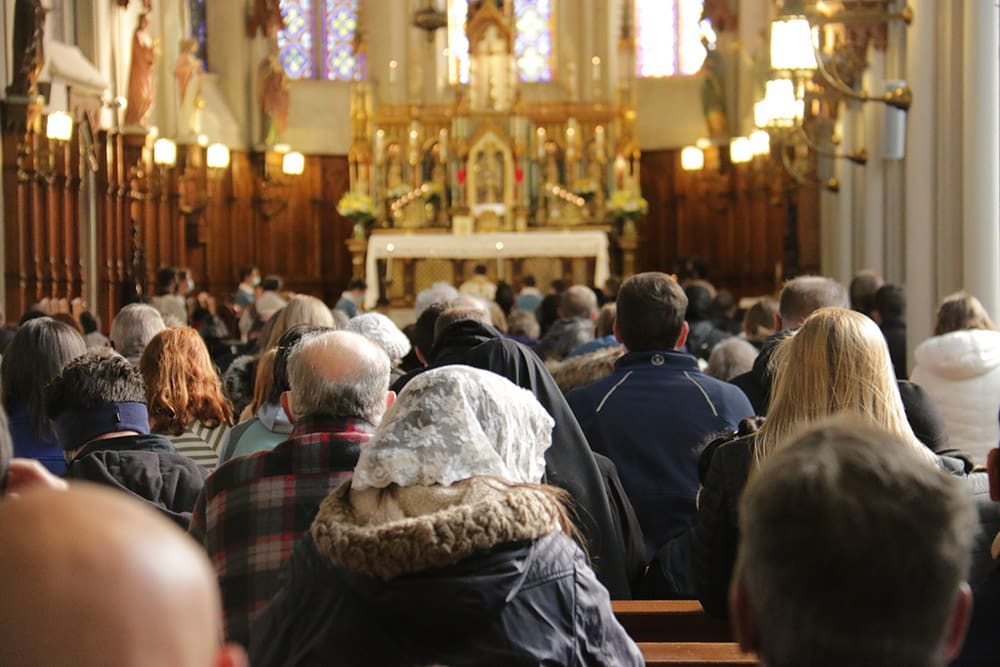 Question: I understand that Jesus primarily spoke in Aramaic. The New Testament was written in Greek, then translated a couple of times to get to our English language. My question is, where did the language that includes “saith,” “thee,” “knowest,” “believeth,” etc., come from? Is that how Jesus spoke, or did this arise throughout the different translations over time?
Question: I understand that Jesus primarily spoke in Aramaic. The New Testament was written in Greek, then translated a couple of times to get to our English language. My question is, where did the language that includes “saith,” “thee,” “knowest,” “believeth,” etc., come from? Is that how Jesus spoke, or did this arise throughout the different translations over time?
— Paul VanHoudt, Erie, Colorado
Answer: The older English translations such as the Douay-Rheims Bible and the King James Bible were written in a time when English included different verb endings such as “knowest” and “believeth,” as well as pronouns such as “thee” and “thou.” The English of the 16th century also included different spellings — for example, “Holie Bible.”
As you note, Jesus spoke Aramaic and likely some Greek. There is no Aramaic text that has come to us. There is only the inspired Greek version on which all other modern translations are based. Like all languages, ancient Greek had certain idioms that are hard to replicate in other languages. Hence, English translations had to render complex Greek constructions in ways intelligible to English speakers of various eras. English, too, has changed through the centuries, and thus newer translations have become necessary to make the text more understandable.
Your wonderment if Jesus spoke in such elevated ways is likely answered, “no.” While we do not have access to his Aramaic teachings, the Greek of the New Testament is Koine Greek. Koine is simply the Greek word for “common.” It was the language spoken by the masses and less formal than the classical Greek found in the academies and spoken by Plato and Aristotle. Hence the Koine Greek of the New Testament renders Jesus’ words in a straight-forward, ordinary way.
When St. Jerome translated the New Testament into Latin, he also used the “vulgate” form of Latin. This, too, was the Latin of the “vulgus” or “crowd.” The high Latin of Cicero and Virgil was not employed. This means ordinary Latin was used, not high Latin. So, at their initiation, neither the Greek nor Latin texts present Jesus as speaking in a highly formal manner. It is only with the passage of time that older forms of Latin, Greek and English sound formal or “stuffy.” Modern English translation has sought to restore the easily accessible language of Jesus, Paul and others in the New Testament. While this is admirable, some things are lost in translation, and a translator must often balance intelligibility and accuracy. Nothing is ultimately better than for a scholar of the New Testament to master Greek and read the text in the original and inspired language. The same may be said for the Hebrew of the Old Testament.
Catholics and slavery
Question: Did nuns own slaves? Did they treat them poorly as inferiors or as humans?
— Name withheld, Pennsylvania
Answer: That religious communities of both men and women in the Catholic Church owned slaves cannot be denied. We may wish to conclude that slaves owned by priests and nuns were better treated than other slaves, however it is difficult to generalize. Some were baptized and catechized and treated as heirs to the kingdom of God. But, even as we see today, there are some Catholic priests and religious who carefully follow Church teaching and others who are rebellious. Never mind that in Sublimus Dei (1537) Pope Paul III prohibited the enslavement in the Americas, asserting that they “should not be deprived of their liberty.” Never mind that in 1839, Pope Gregory XVI condemned slavery, with particular reference to New World colonial slavery and the slave trade. Catholics, then as now, often ignored Church teaching and proved themselves more worldly than spiritual and of the kingdom of God.
There are stories of Catholic nuns “selling off” a slave as a fundraiser, and other such atrocities. Is this anti-Catholic propaganda, or are is it a truthful account? It is hard to say. But we cannot say that all Catholics were exemplary in opposing slavery and later discrimination against African Americans. Sadly, we are too reflective of the prevailing culture in our worst moments and rarely courageous as a group when confronting injustices. Church teaching is clear: Slavery cannot be tolerated. It took too many years for Catholics, even priests and religious, to embrace what the Church summoned them to announce and live: the glorious freedom of all the children of God.
Msgr. Charles Pope is the pastor of Holy Comforter-St. Cyprian in Washington, D.C., and writes for the Archdiocese of Washington, D.C. at blog.adw.org. Send questions to msgrpope@osv.com.







